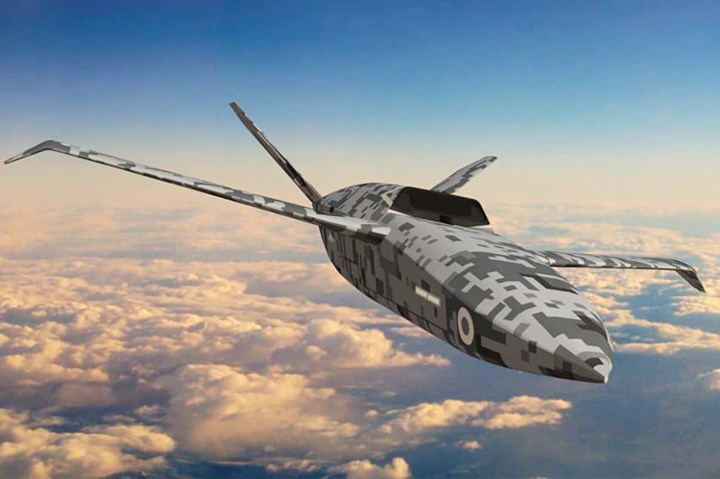Spirit AeroSystems to lead MOSQUITO uncrewed fighter development
U.K. government awards £30-million, three-year contract to design and manufacture a prototype supporting more than 100 jobs in Belfast.

Rendering of U.K. loyal wingman drone. Photo Credit: UK MOD
According to a report from the UK Ministry of Defence (MOD), the U.K. expects to have a prototype loyal wingman-type unmanned aircraft in the air by 2023. The announcement also says that a £30-million contract for the aircraft had been placed with Northern Ireland-based Spirit AeroSystems, which will design and manufacture the Royal Air Force’s Lightweight Affordable Novel Combat Aircraft (LANCA) concept in its new role at the head of Project MOSQUITO, an effort to develop drones capable of working together semi-autonomously with manned aircraft. The deal will be supporting more than 100 jobs in Belfast, Ireland.
The uncrewed combat aircraft will be designed to fly at high-speeds alongside fighter jets, armed with missiles, surveillance and electronic warfare technology. These aircraft will be the U.K.’s first uncrewed platforms able to target and shoot down enemy aircraft and survive against surface-to-air missiles (SAM).
Team MOSQUITO, which also includes Northrop Grumman (London, U.K.), will mature the designs and manufacture a technology demonstrator to generate evidence for a follow-on LANCA program. If successful, Project Mosquito’s findings could lead to this capability being deployed alongside the Typhoon and F-35 Lightning jets, by the end of the decade. LANCA could also be part of the Tempest project.
“Project MOSQUITO is a vital element of our approach to Future Combat Air, rapidly bringing to life design, build and test skills for next-generation combat air capabilities,” says Director Future Combat Air, Richard Berthon. “Autonomous “loyal wingman” aircraft create the opportunity to expand, diversify and rapidly upgrade combat air forces in a cost-effective way, now and in the future.
As announced by the Prime Minister in Nov. 2020, the U.K.’s Future Combat Air System (FCAS) program is set to benefit from a portion of the extra £1.5 billion investment into military research and development.
LANCA was launched in 2015 by the MOD’s Defence Science and Technology Laboratory (Dstl) executive agency and is intended to “understand innovative Combat Air technologies and concepts that offer radical reductions in cost and development time.” While it’s managed by Dstl, LANCA — including Project Mosquito — is led by the RAF’s Rapid Capabilities Office (RCO).
Related Content
-
The next-generation single-aisle: Implications for the composites industry
While the world continues to wait for new single-aisle program announcements from Airbus and Boeing, it’s clear composites will play a role in their fabrication. But in what ways, and what capacity?
-
Plant tour: Aernnova Composites, Toledo and Illescas, Spain
RTM and ATL/AFP high-rate production sites feature this composites and engineering leader’s continued push for excellence and innovation for future airframes.
-
Industrializing additive manufacturing in the defense/aerospace sector
GA-ASI demonstrates a path forward for the use of additive technologies for composite tooling, flight-qualified parts.
















